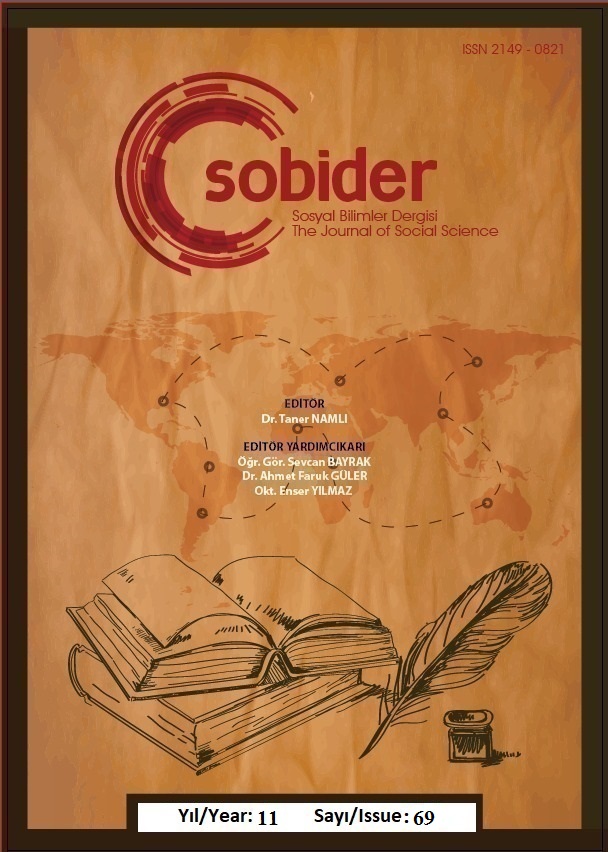NAZIMDA ANI VE ANIYI YAŞAMANIN NİZAMI: ATAOL BEHRAMOĞLU’NUN “BİR SABAH TANIDIK BİR ŞEHRE GİRERKEN” ŞİİRİNDE BİR HÂLİN İZDÜŞÜMÜ
Author :
Abstract
Bir şair yaşama dair geniş görüşlerini damıtıp mısralara, belli bir düzen içinde sınırlı bir şiirsel forma sığdırabilir. Bu açıdan yüzeyde şekillenen estetik yapının gerisinde derin bir mânâ düzlemini bulmak mümkündür. Bu çalışmada da “Bir Sabah Tanıdık Bir Şehre Girerken” adlı eserde şairin mekân-zaman-insan ilişkisine yaklaşımı, şiirin estetik yapısının ardında gizlenmiş anlamsal tabakalar ortaya konulmaya çalışılmıştır. Yine şiirde anılarla iç içe gelişen bir ânda şairde oluşan duygulanım hâlinin bir nizam içinde okura başarıyla aktarılmasını sağlayan ayrıntılar tespit edilmiştir. Şairin değişim gerçeğine dair içinde yaşadığı trajediyi kendi hayatının bir özeti mahiyetinde sunduğu şiirinde âdeta bir yaşam öyküsünün akışı sahnelenir. Tanıdık bir şehre umutla giren öznenin, yolda ilerledikçe umduğunu bulamayıp bilinenin dışında yabancı bir tabloyla karşılaşması, az sözle çok şey anlatan şiirin atmosferinde okura sunulur. Şair insan yaşamına dair vermek istediği mesajını şiirinin sonuna saklarken aslında bütün şiiri de bunun üzerine inşa eder. Bir kompozisyon hâlinde, belli bir nizam içinde önce geçmişe kenetlenilir ve bununla birlikte yoğunlaşan hislerle öznenin yaşamının varlığı duyurulur. Şair, okurla hislerini paylaşıp dikkatleri bu duygusal devinim üzerine odakladıktan sonra da şiirin sonunda yaşam felsefesini ortaya koyar. Şiirde yıllar sonra yeniden tanıdık şehirle buluşan öznenin, aradan geçen zamanla mekâna yabancılaştığını fark edişi ve bu karşıtlıkla (mekânın imkânlı olmasına karşılık zamanın imkânsızlığı) gelişen insanın derin trajedisi sunulur. Şair için şehrin girişinde birleşen yollar, yıllar kavşağında ayrılır. Dolayısıyla bir anın ve anının şiir hâlinde mısralarda yaşanmasının ve şekillenmesinin nizamı, şairin mekâna dair iç dünyasında yaşadığı duygu karmaşasının çözülüşü gözler önüne serilir. Şiirde zamansal karşıtlığa rağmen mekânsal koşutluk karşımıza çıkar. Çünkü zaman olarak geçmişte yaşanılanlarla şimdiki manzara farklıdır, ama gelinen noktada insan da mekânla birlikte değişmekte ve bu açıdan aralarında yeni bir bağdaşım oluşmaktadır. Mekâna odaklanıp şehirle insan arasında anılar yoluyla güçlü bir bağ kuran şair, mevcut zamanda bu bağın yabancılaşmayla beraber zayıfladığını hissettiği an, mekân ile insan arasında yeni bir ilgi oluşturabilmek için bu kez insana odaklanarak birlikte değişim ve gelişim durumuna dikkat çeker. Dolayısıyla edebiyat ve felsefenin yolunun kesiştiği noktada ortaya çıkan “Bir Sabah Tanıdık Bir Şehre Girerken” şiirinde şairin yaşama dair derin algısının ve bakış açısının şiirin imkânlarından faydalanılarak estetik bir düzlemde ifâde edilişi şiirden örneklerle sunulmaya çalışılmıştır.
Keywords
Abstract
A poet can distill his broad views about life and fit them into verses, into a limited poetic form in a certain order. In this respect, it is possible to find a deep plane of meaning behind the aesthetic structure shaped on the surface. In this study, in the work titled " When Entering a Familiar City One Morning”, the poet's approach to space-time-human relations and the semantic layers hidden behind the aesthetic structure of the poem are tried to be revealed. Again, in the poem, details that enable the poet's emotional state at a moment that develops intertwined with memories to be successfully conveyed to the reader in an orderly manner have been identified. In his poem, where the poet presents the tragedy he experienced regarding the reality of change as a summary of his own life, the flow of a life story is literally staged. It is presented to the reader in the atmosphere of the poem, which tells a lot with few words, that a person who enters a familiar city with hope does not find what he hopes for as he progresses on the road and encounters a foreign painting outside. While the poet hides the message he wants to give about human life at the end of his poem, he actually builds the whole poem on it. In a composition, the past is first clamped in a certain order, and together with this, the existence of the subject's life is announced with intensifying feelings. After sharing his feelings with the reader and focusing attention on this emotional movement, the poet reveals his philosophy of life at the end of the poem. In the poem, the subject, who meets the familiar city again after many years, realizes that he has become alienated from the place over time, and the tragedy of the human being that emerges as a result of this contrast(the possibility of space and the impossibility of time) is presented. For the poet, the roads that converge at the entrance of the city diverge at the junction of years. Therefore, the order of living and shaping a moment and a memory in verses as a poem, and the resolution of a complicated situation are revealed. Despite the temporal opposition in poetry, spatial parallelism arises. Because in terms of time, the past and the current landscape are different, but at this point, the human being also changes with the space and a new harmony is formed. Focusing on the place and establishing a strong bond between the city and the people through memories, the poet focuses on the human being in order to create a new interest between the place and the human, together with the alienation of this bond in the current time and draws attention to their state of change and development together. Therefore, in the poem " When Entering a Familiar City One Morning ", which emerged at the intersection of literature and philosophy, the poet's deep perception and perspective on life is expressed on an aesthetic plane by making use of the possibilities of poetry with examples from poetry.





